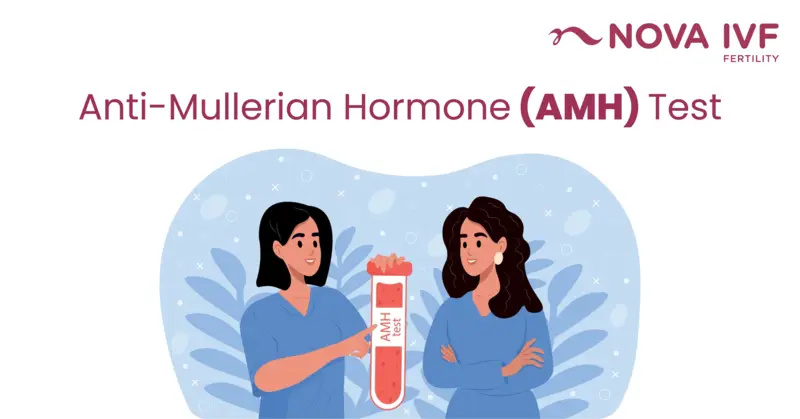Anti-Mullerian Hormone Test

By measuring Anti-Mullerian Harmone levels, your healthcare provider can get information about a variety of reproductive disorders and a sneak peek into your reproductive health. Let’s understand what this test is, what AMH is, and why is it used.
What Is Anti-Müllerian Hormone Test?
An Anti-Müllerian Hormone (AMH) test measures the amount of the anti-Müllerian hormone in a blood sample. The AMH test has proved to be a good evaluator of a woman's ovarian reserve. AMH levels are generally stable and not greatly affected by the menstrual cycle or pregnancy or oral contraception. For this reason, the AMH test can be drawn any time throughout the month.
Anti-Müllerian hormone test yields accurate results when done in conjunction with the antral follicle count (AFC) test. The AFC test assesses the quantity and quality of eggs.
What Is Anti-Müllerian hormone (AMH)?
Anti-Müllerian hormone (AMH) is a protein hormone made by the cells lining the follicles (sacs that hold the eggs) in females and the testicles (or testes) in males. AMH is an important hormone for sexual development of both males and females and plays different roles in both genders.
Normal levels of AMH in your blood fluctuate with your age and are highly dependent on your sex. In a foetus developing inside its mother’s womb, AMH helps form the male or female reproductive organs.
Did you know that every foetus inside the womb in the early weeks of pregnancy has a set of ducts (tubes), which are called Müllerian ducts? AMH makes these Müllerian ducts shrink and the male reproductive organ to form. Male children usually have high levels of AMH till they reach puberty, when AMH levels in their blood begin to decrease. Whereas female babies have very low levels of AMH when they are in the womb, which help the development of their reproductive organs. AMH levels in females start to increase once they reach puberty as the follicles (small fluid-filled sacs that develop and hold eggs till ovulation) start production AMH.
With increasing age, the number of follicles naturally decreases in females due to their natural menstruation cycle. This ultimately leads to a gradual decline in AMH levels in females. Thus, in females, low levels of AMH indicate low ovarian reserve, while high levels of AMH suggest a bright future fertility probability.
Anti-Müllerian hormone is also known as, Müllerian-inhibiting hormone, Müllerian-inhibiting factor (MIF), and Müllerian-inhibiting substance (MIS).
What Is AMH Test Used for?
Men can produce an infinite number of sperms, with millions in reserve. Women, on the other hand, have a limited supply of eggs for their whole lives. Once a woman exhausts all her eggs, there is no chance of conceiving naturally thereafter. Women generally become completely infertile after they have hit menopause. It is, therefore, important for women to identify and gauge their ovarian reserve if they ever plan to have a baby.
Females who are going through fertility treatment may be recommended an AMH test for any of the following:
Check Your Ovarian Reserve
Anti-Müllerian hormone test is a simple blood test to analyse a woman's ovarian reserve and diagnose problems such as PCOD, early menopause, or low ovarian reserve.
This test can give some insight on the remaining quantity of eggs and duration of fertility, but no concrete information about the quality of eggs.
Predict Your Body’s Receptiveness to Fertility Treatment
Normally, your ovaries prepare 1 egg to be fertilised for each menstrual cycle, which is about 21-35 days long. However, if you are going through In-vitro fertilisation (IVF) fertility treatment, your doctor will prescribe medication to promote the production of multiple eggs in 1 menstrual cycle. By getting an AMH blood test done, your fertility expert can get an idea of the dose of fertility medicine required for you to yield optimum results.
Diagnose and Monitor Reproductive Health Conditions
Certain health conditions, such as polycystic ovarian syndrome (PCOS) or certain types of ovarian cancer, lead to high levels of AMH in the body. Thus, your healthcare provider may recommend an AMH test to help with the diagnosis or keep a tab on your health.
An AMH blood test may also be recommended for infants and children to check on their reproductive health or gather more information about a baby who was born with genitals that aren’t clearly male or female.
When Do I Need An AMH Test?
The AMH test is helpful when:
- You have been unable to conceive for over six months and looking for some assurance on your chances of getting pregnant.
- You are contemplating IVF or other fertility treatments since low AMH levels suggest a poor response to IVF.
- You want to understand your current chances of getting pregnant.
- You are being treated for certain types of ovarian cancer.
- You are experiencing symptoms of PCOS.
- Your baby’s genitals aren’t clearly male or female.
- Your baby boy doesn’t have testicles in his scrotum.
What Is a Normal AMH Level?
As you are now aware, AMH levels vary based on your age and sex. In females, AMH levels usually start rising during puberty and peak around 25 years of age, after which a gradual decline till menopause is observed in women. Healthcare providers measure AMH levels in nanograms/millilitre (ng/mL) and the test results mean different things for different individuals.
The general range for AMH levels in an adult female body are as follows:
- Average AMH levels range between 1.0 ng/mL and 3.0 ng/mL
- Less than 1.0 ng/mL are considered low AMH levels
- Less than 0.4 ng/mL are considered severely low AMH levels
Please note that the AMH test result values may vary from lab to lab; thus, it is nest to let your healthcare provider decipher the meaning of your test results and avoid jumping to conclusions.
What happens during an AMH test?
During an AMH blood test, a healthcare professional will take your blood sample using a small needle from a vein in your arm. This blood will be sent to the lab for the testing. You may feel a slight sting when the needle is inserted in your vein, but the pain is short-lived. The entire process of sample collection for AMH test takes a few minutes. Depending on the lab’s infrastructure, your test results will be ready in about 2-4 days.
Are There Any Risks Associated with AMH test?
There is little to no risk involved in getting an AMH test as the process only involves drawing blood from your vein. The pain or accidental bruising that you may experience during or after the blood draw usually go away on their own in a while.
If the needle used for drawing blood is contaminated, you might develop an infection, but this is extremely unlikely as healthcare professionals use fresh needles.
Results of AMH Test
You will need help from your healthcare provider in evaluating your AMH test results as the implication of the test result varies based on several factors.
- AMH test results of females who are trying to get pregnant can share information about their ovarian reserve. High levels of AMH in case of such females indicate the availability of more eggs and low levels of AMH in such cases indicate a shrinking egg supply.
- AMH test results for females who were tested for PCOS show high levels of the hormone in their body. Further testing is then recommended to such females.
- AMH test results for females who were tested for menopause show low levels of AMH. If AMH levels in your test results are 0 or close to zero, it indicates that you are in menopause.
- AMH test results for females who were tested for ovarian cancer show high levels of AMH. Over the course of cancer treatment, a drop in AMH levels in the female’s body indicate that the treatment is working fine, and an increase in AMH levels indicates that the treatment isn’t working.
- AMH test results for undescended testicles in a male infant or child reveal the presence or absence of health testicular tissue. Normal AMH levels indicate that the child has working testicles, and low or 0 AMH levels in the test result indicate that the baby’s testicles are not working properly or are absent.
Conclusion
AMH levels in the female body can indicate the number of eggs in the ovaries; thus, this test is used by healthcare professionals during fertility treatment among other scenarios. High levels of AMH in the blood means that the female likely has more eggs, whereas low levels of AMH indicate a low number of eggs in the ovaries. Your healthcare provider may recommend additional tests to evaluate the quality of your ovarian reserve after assessing your AMH test results.
FAQs About AMH Test
Q. Can AMH test results predict my fertility?
A. No. AMH test results can tell you whether you have a high or low egg count, it cannot share any insight on the quality of your eggs, which is one of the key influencers in your fertility.
Q. Can I take an at-home AMH test?
A. If a finger-prick AMH test is available at your pharmacy, you can take it. But these tests are not 100% reliable, and your healthcare provider will likely recommend you give your blood sample to a reputable laboratory for AMH testing for your treatment or diagnosis.
Q. When can I do the AMH test?
A. Since AMH levels don’t fluctuate much through out your menstrual cycle, you can take this test any time during the month.
 Infertility Counselling
Infertility Counselling Female Infertility Treatment
Female Infertility Treatment Andrology Treatment
Andrology Treatment Fertility Enhancing Surgeries - Female
Fertility Enhancing Surgeries - Female Fertility Enhancing Surgeries - Male
Fertility Enhancing Surgeries - Male Endoscopy Treatment
Endoscopy Treatment IUI Treatment
IUI Treatment IVF Treatment
IVF Treatment ICSI Treatment
ICSI Treatment Advanced IVF Solutions
Advanced IVF Solutions Embryology
Embryology Vitrification Egg, Embryo, Sperm Freezing
Vitrification Egg, Embryo, Sperm Freezing Preimplantation Genetic Testing (PGT)
Preimplantation Genetic Testing (PGT) Donation Program Embryo / Egg / Sperm
Donation Program Embryo / Egg / Sperm Self-cycleTM IVF
Self-cycleTM IVF

 Self-cycleTM IVF
Self-cycleTM IVF








